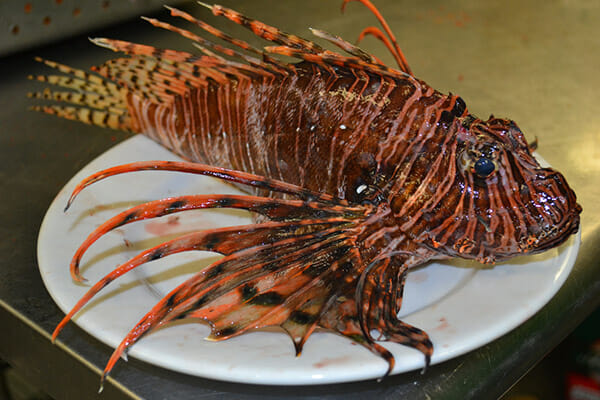How to Get Rid of Lionfish? Eat ‘Em
If you’ve seen Lionfish on Alabama restaurant menus lately, you might’ve been uncertain about the dish. Perhaps you’ve never tried it before, or perhaps you’re concerned about those venomous spines.
The truth is, those spines won’t hurt you, and Lionfish is delicious—and the more you eat it, the more you’ll be helping the aquatic ecosystem of Alabama’s Gulf Coast.
That’s why coastal chefs like Chef Brody Olive of Voyager’s Restaurant—who also happens to be our 2017 Alabama Seafood Cook-Off champion—are doing something about it. Through his restaurant and his work with the NUISANCE Group, Chef Olive and his cohorts are trying to get Lionfish out of our Gulf waters and onto more restaurant plates throughout the South.
We spoke to Chef Olive about what inspired this mission, how he’s spreading the word about Lionfish, and the best ways to cook this underrated fish.
When were you first made aware of the Lionfish problem here on the Gulf Coast?
Ominous fish sightings began around 2010 off the Alabama Gulf Coast. By 2012, we were crafting recipes!
What makes the Lionfish an “invasive species” in our coastal ecosystem?
Lionfish are native to the Indo-Pacific from the other side of the Globe! These fish were reported in the U.S. as early as 1992 after Hurricane Andrew hit. Lionfish are a very popular species among aquarium owners. The speculation was that the storm released a larger stock of exotics to the Florida Keys. Lionfish reproduce year-round, with an ability to lay up to 17,000 eggs every 3-4 days. It wouldn’t take too many specimens to create a large population. And the Gulf of Mexico has no known natural predator of the Lionfish, so populations exploded.
What inspired you to form the NUISANCE Group with Chris Sherrill? What is the NUISANCE Group’s mission?
The initiative is still front and center, but the NUISANCE Group itself is not active at the moment. As the story goes, Chris and I both avid outdoorsmen and fishermen, and in the culinary trade, we saw an opportunity to bring Lionfish to the “table.” NUISANCE is short for Nuisance, Underutilized, Invasive, Sustainable, Available, through Noble, Culinary Endeavors. We’ve focused on both flora and fauna. There are so many tasty Gulf fish besides the most common choices like Grouper, Snapper, and Tuna. This was a great platform for us to explore the depths of the Gulf fishery. We want to be able to source all the beautiful species that the Gulf fishery produces for many years to come. I believe to do that we need to educate our guests on the alternative options that are swimming around!
How have events (dinners, fishing tournaments) helped raise awareness of Lionfish?
Lionfish tournaments have been a huge success, and they still seem to be going strong. The best way to remove these fish is with a spear! With no bag limit or a set season, this fish is a candidate for year-round action. We showcase the fish during wine dinners or cook-offs, and we’ve found that this is the best way to get folks to sample the fish and understand the delicate flavor of its flesh.
Tell us more about Lionfish being safe to eat. What’s the distinction between being a venomous fish and a poisonous fish?
This is where most people get mixed up. Venomous would suggest that the fish/animal distributes its toxin through a bite or a sting, whereas a poisonous fish/animal harbors the toxin in its flesh or excretes the toxic through its skin. A dart frog is a good example of a poisonous species. We’ve had “poisonous” animals front and center here in the South with our “venomous snakes” (I can promise my grandmother never referred to a water moccasin as “venomous”). I understand the confusion, but Lionfish, as a venomous species, is safe to eat.
How do you like to prepare Lionfish in your restaurant?
Lionfish is on the menu in Voyager’s year-round! We serve it as a Tiradito, which is a Peruvian dish. The fish is cut sashimi style and soaked with a citrus & serrano broth. This is a raw application that really showcases how light and flavorful Lionfish filets are.
For those with access to Lionfish product, how would you recommend preparing it in their own kitchen?
An excellent and straightforward preparation for any fresh fish, in my opinion, is a light sprinkling of sea salt and pepper, a quick sear in olive oil, and a finish with fresh lemon. Lionfish is a very mild, super flaky white fish. And it is a very quick-cooking fish due to its small size.
For those who’ve never tried Lionfish, why should they order it when they see it on a restaurant menu?
If you have never tried Lionfish, you should try it! Not only will you find it’s a delicate, smooth eating fish, you should feel good that you are helping the Gulf one bite at time!

